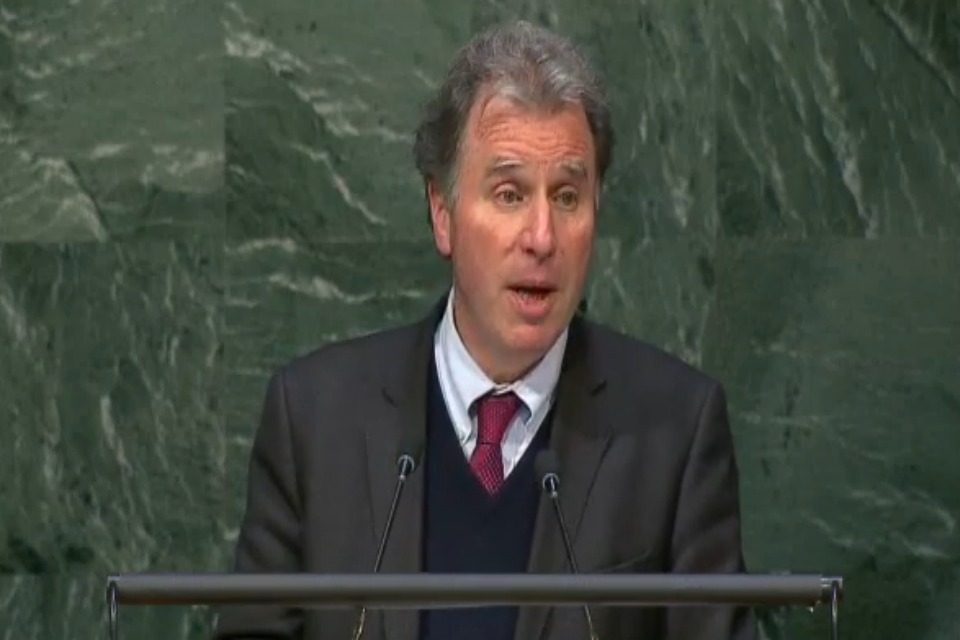"We must redouble our efforts to meet the challenge of new psychoactive substances, to bring the most harmful substances under international control."
Statement by Rt Hon Oliver Letwin, Minister for Government Policy in the Cabinet Office at the UN Special Session on The World Drug Problem

Chair and distinguished guests.
The United Kingdom welcomes this Special Session as a unique opportunity to enhance the global approach to drugs, and to lay forward a clear roadmap for a new Political Declaration and Plan of Action in 2019.
We must ensure that our work is fully integrated with the Global Goals Because the 2030 Development Agenda and our efforts to address drug harms are complementary and mutually reinforcing.
The United Kingdom welcome the Outcome Document. It combines ambitious goals with operational recommendations that all Member States should consider implementing.
Chair,
The United Kingdom is delivering a modern, balanced, evidence-based response to drugs within the UN conventions.
There’s been a reduction in drug misuse among adults and young people over the last ten years in England and Wales and more people are recovering from their dependency now than in 2009.
We are currently developing a new drug strategy, which we will publish shortly. Our 2016 drug strategy will build on our current balanced approach of reducing demand, restricting supply and building recovery, and will tackle drugs as a key driver of crime.
Chair,
Responding to the global challenges posed by new psychoactive substances is a priority for the UK.
In January we introduced new legislation, the Psychoactive Substances Act 2016. This introduces a general ban on the production, supply, import and export of all new psychoactive substances and complements our wider, balanced response.
Over the last three years the United Kingdom has worked to demonstrate global leadership on this issue, with the long-term objective of establishing a sustainable international system that can deal effectively with new psychoactive substances.
Our work has included forming the International Action Group on New Psychoactive Substances – an informal group of Member States and international organisations that seeks to coordinate and drive the international response.
The international community has made significant progress, but there is more to be done.
We must redouble our efforts to meet the challenge of new psychoactive substances, including through data-sharing, policy exchange and international cooperation to bring the most harmful substances under international control.
Chair,
The United Kingdom implements a smart, proportionate criminal justice response at each stage of the process.
This includes alternatives to incarceration for minor drug offences, integration of criminal justice and health services to ensure that offenders who misuse drugs get the support they need, and independently-produced sentencing guidelines that ensure consistency and proportionality in sentencing.
Importantly, the United Kingdom delivers proportionality in criminal justice and good health outcomes while retaining a criminal offence for drug possession.
Chair,
The United Kingdom has a proud history of championing human rights, and we oppose the use of the death penalty in all circumstances as a matter of principle.
The UK does not provide criminal justice, or other assistance, which may result in a death sentence being applied. We will hold international agencies funded by the UK to account for compliance with this and all other human rights obligations.
Chair,
The United Kingdom remains fully committed to reducing the transmission of HIV and other blood-borne diseases among people who inject drugs.
The agreed target of reducing HIV transmission by 50% by 2015 has not been fully met, but we have the tools to achieve this reduction now at our disposal.
We have clear evidence that the package of measures set out in the WHO’s 2014 Consolidated Guidelines are effective.
The UK is proud to be the second largest international funder of HIV prevention, care and treatment, and we will continue to take a leading role on this issue, including at the High Level Meeting on HIV/AIDS in June.
Chair,
Up to 5.5 billion people live in countries with low or non-existent access to controlled medicines. Too many people live and die in avoidable pain.
The UK will continue to invest in supporting health systems across the world, and we must strengthen international efforts to make material progress here, in accordance with the roadmap set by the Global Goals and the accompanying targets.
Chair, thank you for this opportunity to address the General Assembly.